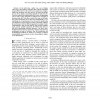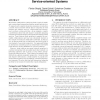165 search results - page 4 / 33 » Discussions on Interpretability of Fuzzy Systems using Simpl... |
118
Voted
CEC
2008
IEEE
15 years 9 months ago
2008
IEEE
— In the early days a policy was a set of simple rules with a clear intuitive motivation that could be formalised to good effect. However the world is now much more complex. Subt...
105
Voted
ECIS
2004
15 years 4 months ago
2004
Discursive-based analysis of organizations is not new in the field of interpretive social studies. Since not long ago have information systems (IS) studies also shown a keen inter...
110
Voted
BCSHCI
2007
15 years 4 months ago
2007
This paper briefly shows how product designers as well as information system designers may use the habitat framework as a tool to inform their understanding of the pervasive compu...
127
Voted
SAC
2010
ACM
15 years 9 months ago
2010
ACM
Web-based collaboration systems typically require dynamic and context-based interactions between people and services. To support such complex interaction scenarios, we introduce a...
133
Voted
CORR
2010
Springer
15 years 2 months ago
2010
Springer
Refinement types sharpen systems of simple and dependent types by offering expressive means to more precisely classify well-typed terms. We present a system of refinement types for...



